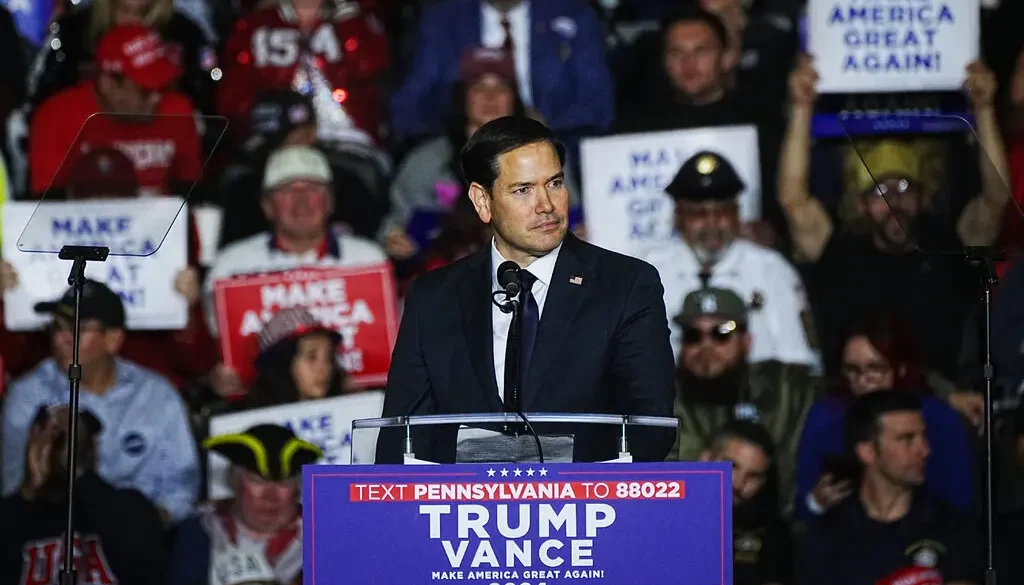Trump Likely to Appoint Marco Rubio as Secretary of State
Marco Rubio Decision by Trump to Appoint
A potential Donald Trump nomination of Marco Rubio to be his Secretary of State could herald dramatic changes in the American foreign policy.
Marco Rubio is a staunch neoconservative who had also long been advocating a more interventionist, proactive approach to dealing with Russia, China, Latin America, and the Middle East.
His background, values, and policy preferences will signal that a State Department headed by Rubio can introduce radically different U.S. engagement globally.
Background of Marco Rubio and His Political Standings
Marco Rubio is a senior U.S. Senator from Florida, but what’s worth mentioning is that he has been part of the American politics scene since 2010.
Marco Rubio known for his take that is quite strong on national security as well as foreign affairs and conservative values, brings a lot of experience to the role.
He was a member of the Senate Foreign Relations Committee and frequently spoke on critical international issues, including U.S. relations with China, Russia, Latin America, and the Middle East.
Rubio’s foreign policy stance will be where the United States asserts its presence on the world front, boasting democracy and holding human rights at its core while cautious of regimes that may go against the interest of the U.S.
His stance on issues tends to be generally hawkish in nature, looking for policies that safeguard American influence and values globally.
Rubio’s Potential Priorities in Foreign Policy
If Rubio were to become the Secretary of State, his priorities are going to be along the following lines:
China and Asia-Pacific Region: Rubio has time and again been a votary for a stern policy against China.
He views China as a strategic competitor who harbors authoritarian ambitions against democratic values and international norms.
As Secretary of State, he would most probably pursue policies intended to thwart China’s gains in the economies, technology, and military power by strengthening alliances with Japan, South Korea, Australia, and India.
Rubio also might call for more restrictions on Chinese tech corporations and would advocate for policies that provide for manufacturing independence from China.
Middle East Policy and Israel Relations: Rubio is a staunch supporter of Israel and would advocate for policies beneficial to U.S.-Israel relations.
He would probably favor continued U.S. involvement in the region, opposing elements acting to destabilize the region, such as Iran and some of the non-state actors.
Rubio’s appointment may call for fresh U.S. engagement in attempts to maintain their dominance over the region, enhance efforts at counter-terrorism, and build support toward the allied countries as they grapple with the regional conflagration.
Latin America and Venezuela: Rubio is Cuban-American and, for so long has insisted on democratic promotion in Latin America.
While the regimes of Venezuela and Cuba have been put under scorn and attacked by him as authoritarian, he has called upon proper sanctions and diplomatic pressure for democratic reforms in place.
He is likely to make the State Department be more assertive in promoting democracy and fighting corruption in the Western Hemisphere.
Russia and Eastern Europe: Rubio has expressed extreme concern about Russia’s aggressive machinations in Eastern Europe and even its influence to interfere with U.S. and global elections.
Hence, Rubio is likely to be strongly pro-NATO, he is supposed to argue that military as well as financial support should be given to Eastern Europe countries to curtail Russia’s influence over those areas.
He is going to try to add more sanctions on Russia and cybersecurity even more by trying to prevent interference in the next elections.
Human Rights and Democracy Promotion: Since Rubio advocates for the protection of human rights, these issues could be pushed to a high profile in U.S. foreign policy.
He may use diplomatic and economic levers to tackle human rights violators, especially in countries characterized by repressive regimes.
This may include much greater pressures through diplomacy, sanctions, or other actions that may call into line U.S. foreign policy with the pronouncements of its state values.
Implications of all this for U.S. Diplomacy and Alliances
Rubio might have a vital interest in alliances to the United States, such as those within Europe and Asia-Pacific.
A good coalition of allies must be formed to face the influence exerted by China and Russia.
As the Secretary of State, Rubio may look into rebuilding some alliances and getting them back on track since the last ten years, especially those in the EU as well as those in NATO countries.
He would likely deepen alliances with Indo-Pacific allies, working together on issues such as economic security, freedom of navigation in the South China Sea, and responses to regional security threats.
The Trump-Rubio Dynamic and Policy Implementation:
While Trump and Rubio share some of the same goals on many policy elements, such as wanting to project more U.S. power globally, they may differ in approach.
Trump tends to be more transactional in his foreign policy approaches, as well as more populist in nature, whereas Rubio will be more long-term in strategic alliance building and ideologically opposed to authoritarianism.
That alone would make for very interesting dynamics if he were Secretary of State, balancing the Trump style with idealistic principles.
Issues Rubio Would Face If He Became the Secretary of State
Confirmed or not, Rubio would have to surmount some challenges in regard to his foreign policy vision:
Striking a Balance in Bipartisan Support:
Sometimes, Rubio’s policies may run contrary to the views held by Congressional members Republicans and Democrats alike, who may advocate for less interventionism.
Rubio shall have to work tirelessly to build bipartisan support for most of foreign policy issues that would require Congressional approval.
Global Instability and Complex Crises:
Rubio will be inheriting a complex global scenario dealing with ongoing conflicts, rising authoritarianism, and economic disruptions.
The Ukraine conflict, Iran’s nuclear program, North Korea’s missile tests, etc., will have to be skilfully and decisively handled by his administration in diplomatic matters.
Domestic Economic Restrictions:
With the national focus on rebuilding the economy and domestic matters, Rubio may not have too much muscle in drawing significant resources for a major foreign policy overhaul.
His vision may have to become beholden to the realities of being on a shoestring budget and where the U.S. influence or resources are best applied.
How Rubio’s Selection May Change U.S. Foreign Policy
With Rubio heading the State Department, U.S. foreign policy may search for renewed focus in asserting American influence and spreading democratic values around the world. His focus on human rights and close alliances may translate to a more robust U.S. presence in concerns overseas. Lastly, Rubio would be expected to support the Trump administration in policies that generate economic benefit for American interests.
His focus on stopping authoritarian regimes and pushing for democracy aligns well with the general theme of America’s exceptionalism, positioning America as the representative nation of freedom.
At the same time, Rubio’s loud-talking style could also make other nations nervous, and a lot of diplomacy will have to be undertaken to balance U.S. interests with world stability.
Conclusion: What Rubio’s Legacy as Secretary of State Could Be
If confirmed, Rubio’s term as Secretary of State would mark the step change U.S. foreign policy needed in emphasizing solid alliances, democracy, and human rights.
He has a record and positions to uphold a vision of America standing strong against authoritarianism and fighting for freedom.
However, the test will really be how to balance outwardly aggressive policy goals against the constraints of the global and home environment and lead in partnership with Trump.
With the appointment of Rubio, the administration underlines its commitment to an active, values-based foreign policy. The world will wait with bated breath to see if this vision can be translated into diplomatic success.


